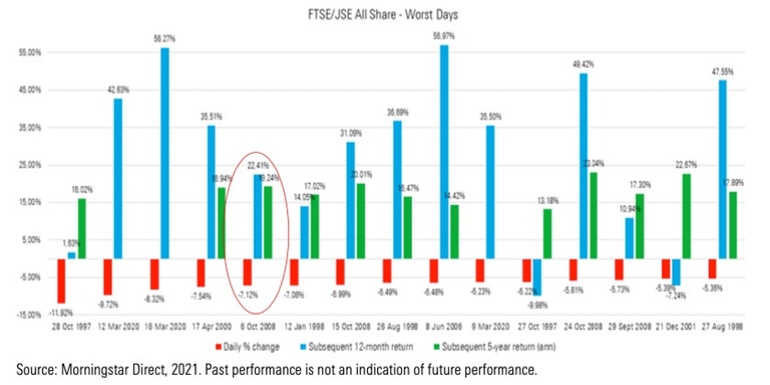When we experience our first crisis, we think our world is about to end. It could have been our first unrequited love when we were 12, a rejection letter from an application when we were barely out of our teens, bad news from the doctor or an accident that leaves us dealing with a deep loss.
Sometimes it can be our hundredth crisis, and it can still leave us wondering how we can proceed; perhaps it sparks our emotions to do something wild or reckless, or maybe we feel the numbing reality that life is about to change significantly.
As Victoria Reuvers, Managing Director at Morningstar Investment Management South Africa, recently wrote – these experiences begin to feel like déjà vu? From rioting, demonstrations and political unrest to natural disasters, heatwaves and market crashes – we can’t help but ask: Have we been here before?
Not necessarily.
Reuvers goes on to say that “while it’s impossible to comprehend and rationalise what we are going through as families, communities and as a country, one thing that we know to be true, that we will survive this and we will rebuild this nation.
When the dust settles, and we sit at home and reflect, we find ourselves wondering about the future, and we worry. We worry about when/how life will ever return to ‘normal’. We worry about the health of our family, friends, and colleagues. We worry about the economy and work. We worry about money and our savings. While we are not able to guide all these worries, we can provide more context around money, savings, and investments.”
When markets rise and fall with the influence of investor emotion and sentiment, it’s only natural that many investors may grow tired of stomaching the unpredictable rollercoaster ride and would much rather prefer to place their feet on solid ground. As Reuvers says in her article: In the world of investments, the rollercoaster ride is equities, and cash is often seen as the solid ground.
From the graph of Morningstar Direct (featured above), we can see the 15 worst days on the JSE (the red bars) since the end of June 1995 and how the local market reacted after the drawdown. The blue bars show the 12-month returns investors experienced after the worst day, and the green bars show the five-year annualised returns after the drawdown.
For example, during the 2008 global financial crisis on 06/10/2008, there was a loss of -7.12% for the day, but the subsequent one-year return amounted to 22.41%, and the annualised five-year return was 19.24%.
During times of negativity and volatility (which may feel like déjà vu), many advisers would tend to recommend to investors who are in Equities to retain their exposure to this asset class since experience shows us that short-term phenomenon generally should not detract from the long-term value of equities.
When this is the case, price declines may produce buying opportunities. Warren Buffett, chairman and CEO of Berkshire Hathaway, said, “you don’t buy or sell a business based on today’s headlines. If the market gives you a chance to buy something you like and you can buy it even cheaper, then it’s your good luck.”
Ultimately, investors should remain calm and remember that time in the market is superior to timing the market.
Investing in the equity market is a long-term pursuit and is best used to reach long-term goals such as retirement. As the saying goes – a river cuts through a rock, not because of its power, but its persistence.
The habit of investing is one of the best habits you have within your control. Doing nothing and staying the course is still a decision. It is often during these difficult times that we have the greatest opportunity to add value for our clients, acting rationally when others struggle to do so.
(Please contact me if you’d like a copy of Victoria Reuvers’ article)

